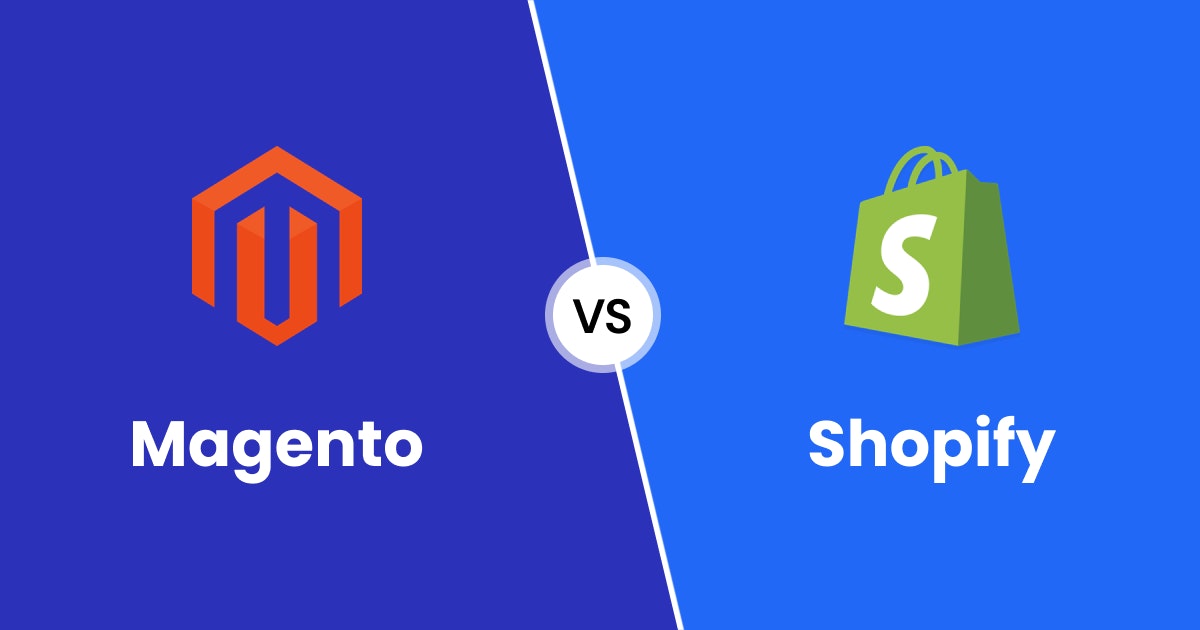The ability to conveniently shop online is now vital in people's lives. An eCommerce website gives them the comfort to browse numerous brands and products, compare prices and vendors, and view sizes and materials.
They can even return their orders if they are not happy with what they purchased. No wonder the worldwide retail eCommerce sales of $4.9 trillion in 2021 are estimated to grow by 50% and reach $7.4 trillion by 2025.
Seeing the increasing popularity of the eCommerce industry, one thing is clear: there is never a better time to set up an online store.
However, given the wide variety of frameworks and development platforms on offer, it is challenging to pick an option that best suits your eCommerce requirements. However, we are here to make your job easier.
Among the many popular choices available in the market, Magento and Shopify are the most used eCommerce development platforms. They are cloud-based Software as a Service (SaaS) solutions that help you set up the business of your dreams online without any hassle.
While Shopify is known for its ease of use, Magento offers more customizable features. In this article, we will compare both options to decide which eCommerce development platform is a better option for building your online storefront. Let us begin:
Everything you need to know about Magento 2
Although Magento is now Adobe Commerce, it still remains the world's largest eCommerce platform, with over 250,000 active online stores. Anyone who wants to build a sturdy online business and has researched on their own would have come across Magento!
It is an open-source option released in March 2007 by Roy Rubin and Yoav Kutner under Varien Inc. An improved second version of Magento was launched in June 2020.
Due to its versatility, Magento 2 is the most popular CMS for developing eCommerce websites. It offers a robust architecture with scalability. Magento Commerce, Magento Commerce Cloud, and Magento Open Source are the three types of Magento platforms.
Depending on what you choose, the pricing differs. For instance, the licensing cost for Magento Commerce stands at $22,000–125,000 per year, for Magento Commerce Cloud is available for $40,000–190,000 per year, and for Magento Open Source, it is free.
Features
Similar to Shopify, Magento 2 is also known for its fantastic list of features. It is free to install on your computer, and with the help of many plugins and extensions, you can kickstart an eCommerce storefront of your dreams.
1. Customer development
Magento is an excellent platform for those looking to market their products and services using email campaigns, gift-wrapping options, product wishlists, limited-period coupons, and offer promotions. An eCommerce development company can help you customize the store and enhance its capabilities as needed by you.
2. Instant checkout
Besides enjoying the usual shopping cart capabilities, an instant checkout page of Magento speeds up the checkout process. This allows the shoppers to check out from the product page itself easily. Amazon pioneered the technology.
3. Marketing add-ons
Just like Shopify, you can find extensions in Magento's marketplace and integrate them with your marketing tools — be it SEO, email, or social media. Avail of 4,500 different add-ons and improve your site's functionality and marketing.
4. Multiple site management
If you are running multiple Magento sites, you can manage them all from one admin panel and create, preview, and schedule content updates from a single dashboard. The advanced site management capabilities of Magento allow you to control multiple online stores effectively.
5. Payment processing
You can benefit from the multiple payment gateway integrations available with Magento. Although it does not have its processing tool, Magento works well with standard payment gateways like Braintree and PayPal. It has integrations with 300+ international gateways.
6. Reporting
Magento's platform allows you to access 100+ pre-defined reports and nine reporting dashboards, along with the capability to design and edit your reports. Running an eCommerce store is no joke. You need to have the right numbers in place.
Leverage Intuz expertise in Ecommerce Development!
Explore NowPros
It is a robust and scalable platform, which makes it suitable for any business size. Plus, it does not demand advanced coding knowledge.
It offers a vast scope for flexibility in customization. With the number of third-party extensions and 100+ mobile-ready themes in place, you can set up an eCommerce platform however you like.
Leverage the tremendous community support received from many users spread across the world. Also, get support available on the phone.
Gain access to a wide range of themes to design your store. Create an engaging shopping experience. Do not get left behind when it comes to design.
Magento offers consistent performance for large inventory plugins. That requires you to optimize the store performance.
Cons
The learning curve of Magento is steep for beginners. There is no scenario when you will not need the help of developers to sort out the eCommerce store for you. Setting up the store is difficult and time-consuming if you do not know the way around.
Given the expensive licensing costs, you will burn a hole in your pocket if you do not consider all expenses while setting up your online store.
It lacks bespoke features and can be limiting if you plan to offer extensive features to your target customers. That will invariably bring up the need for more plugins.
Ease of use
As mentioned previously, the learning curve for building an online store with Magento is much steeper than Shopify. You will need to interpret jargon to understand how to develop your eCommerce business, and that would not be possible every time.
Knowledge of coding is necessary if you want to set up the store independently. In case you need help, you must hire an eCommerce development company like Intuz that is proficient with the works and benefits of Magento.
Applications
Magento is a vast marketplace with over 4,500 extensions and apps for your eCommerce business. You can pick from the numerous free apps. Some other add-ons and apps are paid. Developers or experts might be needed to install apps from the Magento marketplace.
The best Magento apps include:
- Banner Slider to create advertising banners
- Remarkety to run email marketing campaigns
- Amasty Multiple Coupons to generate custom discount coupons
- Product Pre-Order to automatically invite customers to check out your latest products
Top 10 Ecommerce Analytics Tools You Should Know About
Learn moreEverything you need to know about Shopify
It is a feature-rich eCommerce platform with an easy-to-use interface. Founded in 2006 in Toronto, Shopify allows you to build and operate your eCommerce store using its software.
The user-friendly platform offers the necessary tools and themes suitable for beginners and professionals alike. That is why it is such a massive hit among small to midsize businesses. With Shopify, you do not require any coding knowledge.
Its robust drag-and-drop builder is available through five subscription plans — with each offering different features. You can pick up a plan that best suits your needs. If you are unsure, you can also try Shopify for 14 days for free.
Features
One of the reasons Shopify is so popular is the host of features included in the platform. Some of the platform's unique capabilities include:
1. Abandoned checkout recovery
It allows you to automate retargeting of abandoned checkout users through email, nudging, and encouraging them to complete their purchase from your storefront.
2. Shopify's mobile app
Capture the attention (and heart) of mobile shoppers with a robust and extensible application that lets you manage your products, orders, staff, and customers while you are on the fly.
3. Automatic taxes
Whether you are selling abroad or just in your home country, certain sales taxes apply. Shopify automates the taxation bit by adjusting country and state tax rates, allowing you to go global or remain glocal. Setting product prices is hassle-free.
4. Shopify Payments
Shopify offers its payment processor known as Shopify Payments. You do not have to pay any additional transaction fees to use it. It is a great way to impress your target audience and generate more traffic and sales for the business.
5. Customer support
Receive 24/7 support from the Shopify help center and users on their discussion forums and eCommerce university for any roadblocks you may encounter while setting up or running your eCommerce storefront.
6. Blog publishing
Blogging is a huge part of any digital marketing strategy. Shopify has taken care of that, which is why you can educate and engage your target customers through the built-in blogging engine on Shopify. Leverage the power of blogging to build a community around your offerings.
7. Marketing capabilities
Shopify's advanced marketing and sales tools help you reach a wider audience. Leverage tools such as search optimization, discounts, gift cards, loyalty programs, and social media integration to boost your brand visibility and increase your site footfall manifold.
8. Shopify App Store
Yes! Shopify has its app store. Easily extend the functionality of your store by downloading apps from the Shopify App Store, comprising 2500+ apps such as Product Customizer, Oberlo, and Yotpo. 500,000+ merchants love the app store.
Pros
Shopify offers many store themes — over 70 responsive themes with a few free options to pick from depending on your industry niche.
Enjoy the benefits of an extensive app store with 400+ extensions and plugins to improve the functionality of your shopping website.
Receive 24/7 customer support on the phone and live chat so that you never have any problem while running your storefront and your business runs smoothly.
Shopify allows multichannel selling and various payment options. You can create multiple sites and expand to many geographies globally and locally.
Gain the support of a large community of dedicated users. It is designed for everyone — from techies to those with a fundamental understanding of eCommerce.
It offers a customizable mobile app to manage orders and products on the fly. Shopify uses a large inventory and can handle traffic spikes more effectively.
Transaction fees are applicable on all payments except those made through Shopify Payments. So, if you want to use a third-party payment processing tool, that will cost you extra money. Therefore, choose wisely.
Most store themes are paid and can cost anywhere between $100 to $1780. They may seem a bit pricey for some people in terms of price.
Sure, they offer the options of plugins and extensions, however, integrating apps is a highly complex process and does require advanced development capabilities.
Ease of use
Shopify offers a one-stop shop for all your eCommerce store needs. It comes with an easy-to-use drag and drop builder useful for those who are not tech-savvy or know much about HTML. In addition, Shopify has a wizard mode, which allows you to set up your eCommerce store easily by moving the layout around as you want.
12 Payment Gateways To Use For Your Shopify Storefront
Take a TourApplications
When it comes to app and add-on options, Shopify is a lot similar to WordPress. However, please remember that some of the options will require a bit of coding knowledge. The Shopify App Store has over 2,500 apps, out of which few are free.
They cover most online business requirements, such as shipping, email marketing, and social media advertising. The best apps from the Shopify App Market are:
- MailChimp boosts sales by integrating marketing email campaigns.
- Trackr to automate order tracking and sharing status with customers.
- Trust Hero displays digital security badges to encourage purchase decisions.
- Analytics Buddy provides valuable insights from Google Analytics data and displays them on your Shopify dashboard.
Magento vs. Shopify — which is the most suited platform for you?
Now that we have studied the two eCommerce platforms in such incredible detail, it is clear that both have their pros and cons, along with a few similarities. But if you are still confused about what you choose, here are the key points that will help you decide on the right platform:
Opt for Magento because:
Magento allows you to set up the software through an expert and arrange your hosting. That gives you greater control over your business.
It allows you the creative freedom to build and code your store the way you want. This comes in handy if you are looking at creating a fast-scaling business.
Targeting global audiences is more accessible through the built-in multi-lingual support of the platform.
Many intermediate and advanced features are pre-built into the system, so you do not have to worry about integrating plugins and extensions.
It helps you in creating discount codes and calculating discounts. You get to focus on what you love doing, i.e., running an eCommerce business.
Experiment with a large number of free and paid themes without any hassle. Extend the capabilities of your storefront by integrating apps with extended functionality.
Opt for Shopify because:
It is a cloud-hosted service, making it easier even for end-users with minimal technical knowledge to handle the platform. Plus, you can significantly cut down the cost of managing software and self-hosting.
The chances of scaling your eCommerce store into a full-fledged business are high because of the ease of use and the tech support offered.
You can integrate your eCommerce platform with many dropshipping tools that help with creating shipping estimates and cost calculations.
Shopify supports over 70 payment gateways and offers its payment gateway at zero transaction fees.
It allows you to easily change the essential attributes of your eCommerce store using the platform's customization capabilities.
Over to you
The growing number of eCommerce development platforms makes it difficult to decide which one is best for your online store. But if you follow our guide and compare Shopify and Magento in greater detail, then you will have better clarity on which platform would work best for the products or services you intend to deliver.
If you are still confused about the two eCommerce platforms or want to see if you can find some other option in the market, talk to the eCommerce app development experts at Intuz and sort our queries in a jiffy.







